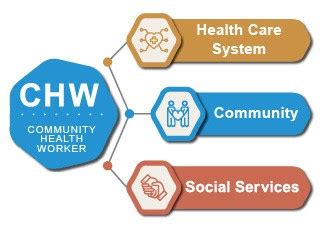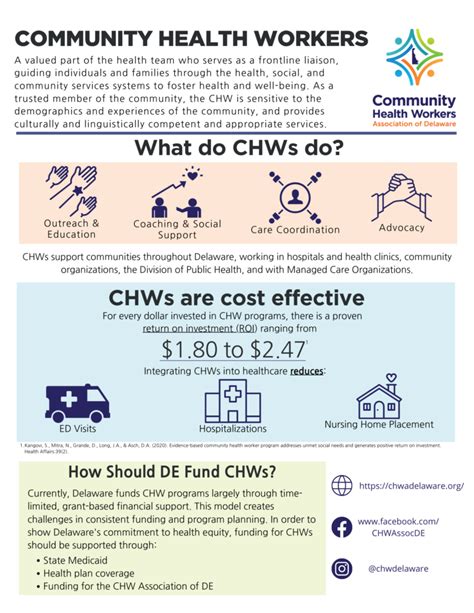Intro
As the healthcare landscape continues to evolve, the importance of community health workers (CHWs) has become increasingly evident. These dedicated individuals play a vital role in bridging the gap between healthcare providers and the communities they serve. By providing essential support, education, and advocacy, CHWs help ensure that individuals and families receive the care they need to thrive. In this article, we will delve into the world of community health workers, exploring the ins and outs of this critical profession.

What is a Community Health Worker?
A community health worker is a frontline public health professional who serves as a liaison between healthcare providers and the community. CHWs work in a variety of settings, including clinics, hospitals, community centers, and non-profit organizations. Their primary goal is to provide culturally sensitive support, education, and advocacy to individuals and families, helping them navigate the complex healthcare system and access essential services.
Key Responsibilities of Community Health Workers
- Provide health education and outreach services to individuals and families
- Conduct home visits and assessments to identify health needs and provide support
- Facilitate communication between healthcare providers and patients
- Advocate for patients' rights and interests
- Develop and implement community-based health programs
- Collect data and track health outcomes to inform program development
The Benefits of Community Health Workers
The benefits of community health workers are numerous and well-documented. By providing culturally sensitive support and education, CHWs can help reduce health disparities, improve health outcomes, and increase patient satisfaction.

- Improved health outcomes: CHWs can help individuals and families manage chronic conditions, such as diabetes and hypertension, by providing education and support.
- Reduced healthcare costs: By providing preventive care and support, CHWs can help reduce hospitalizations and emergency department visits.
- Increased patient satisfaction: CHWs can help patients navigate the healthcare system, reducing stress and anxiety.
- Enhanced community engagement: CHWs can help build trust and foster relationships between healthcare providers and the community.
How to Become a Community Health Worker
If you are passionate about healthcare and community development, a career as a community health worker may be the perfect fit. Here are the steps to become a CHW:
- Earn a high school diploma or equivalent
- Complete a training program in community health work (typically 6-12 months)
- Gain experience in the field through internships or volunteer work
- Obtain certification (optional, but recommended)
- Pursue continuing education and professional development opportunities
Community Health Worker Training Programs
Community health worker training programs are available at community colleges, universities, and vocational schools. These programs typically include coursework in:
- Health education and promotion
- Community outreach and engagement
- Cultural competency
- Health literacy
- Advocacy and leadership
Community Health Worker Certification
While certification is not always required, it can be beneficial for career advancement and professional development. The National Association of Community Health Workers (NACHW) offers a certification program for CHWs.

- Eligibility: Complete a training program in community health work and gain at least 1 year of experience in the field
- Exam: Pass a certification exam administered by NACHW
- Renewal: Complete continuing education requirements to maintain certification
Challenges and Opportunities in Community Health Work
While community health work can be a rewarding and fulfilling career, it also presents challenges and opportunities.
- Challenges:
- Limited resources and funding
- High burnout rates
- Limited career advancement opportunities
- Opportunities:
- Growing demand for CHWs
- Increased recognition of the importance of community health work
- Opportunities for professional development and leadership
Conclusion
Community health workers play a vital role in bridging the gap between healthcare providers and the communities they serve. By providing essential support, education, and advocacy, CHWs help ensure that individuals and families receive the care they need to thrive. If you are passionate about healthcare and community development, a career as a community health worker may be the perfect fit.

We invite you to share your thoughts and experiences with community health workers in the comments below. How have CHWs impacted your life or the lives of those around you?
What is the average salary for a community health worker?
+The average salary for a community health worker varies by location and employer, but typically ranges from $35,000 to $55,000 per year.
Do community health workers need a college degree?
+No, a college degree is not always required to become a community health worker. However, many employers prefer candidates with a degree in a related field, such as public health or social work.
What kind of training do community health workers receive?
+Community health workers typically complete a training program in community health work, which includes coursework in health education, community outreach, and cultural competency.
